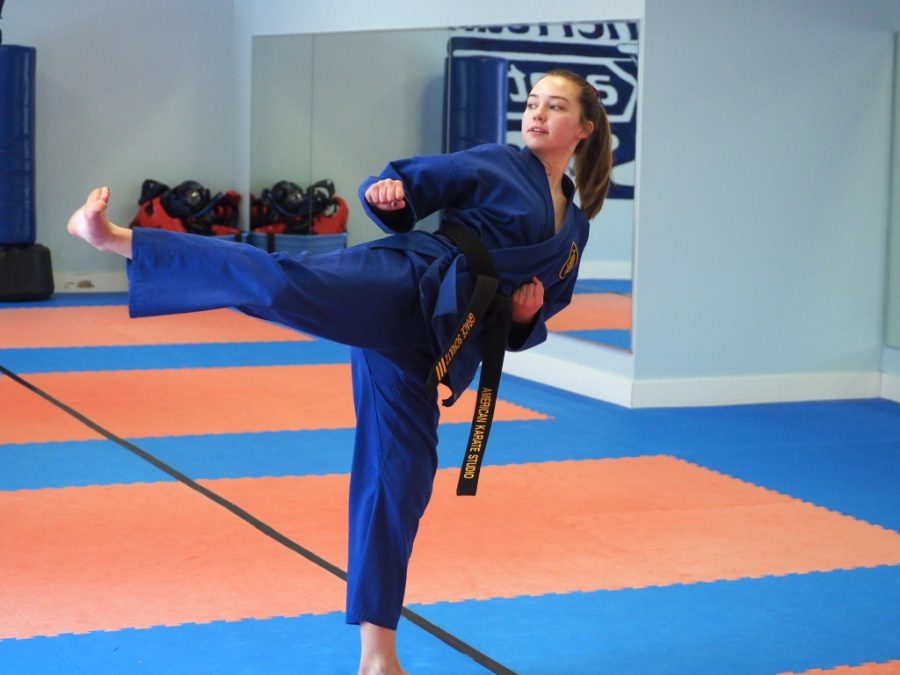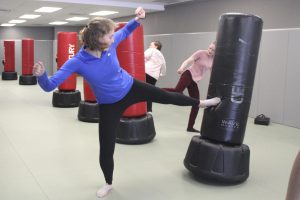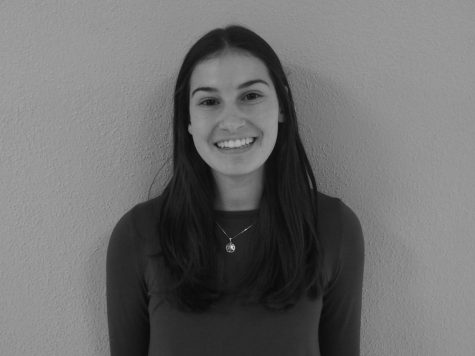Sophomore instructs children’s karate classes
Grace Schultz uses experience to teach others
Sophomore Grace Schultz practices a side kick Feb. 10 on her own time. Schultz has a third-degree black belt and started taking karate lessons at age 5. She began teaching karate in February 2017.
February 21, 2019
Now a children’s karate instructor and third-degree black belt, sophomore Grace Schultz said she began karate when her dad brought her to classes because he wanted her to learn self defense.
“I was really nervous at first but as I kept going and learning new things I kind of got obsessed with trying new things and figuring things out,” Schultz said.
Schultz’s supervisor, karate instructor Sandra Obermiller said all instructors must have a third-degree black belt.
“They need to have their black belt first and foremost so there’s quite a bit of training that goes into getting that,” Obermiller said. “To go from first-degree to second takes two years and to go from second to third takes three years, so it’s five years of being in your black belt before you can be in your blue instructor’s uniform. For Miss Schultz to have obtained that and third-degree black belt at the age of 15 is quite remarkable.”
According to Schultz, she became an official instructor two years ago after one year of practicing.
“There’s a bunch of different belts and each belt has a set of forms, kicks and self defenses so you (to be an instructor) have to know all the forms and self defenses well enough to be able to explain them yourself,” Schultz said.
Obermiller said aspiring instructors must assist her for 100 hours as well as undergo an assessment before they can begin instructing.
“Not everybody makes a good instructor so they have to show interest and I have to decide if it’s something that they’re going to do well with so the students to do we,” Obermiller said. “They have to relearn everything that they learned from a white belt. They have to know all the kicks, all the forms, all the self defenses, all the one-steps and they have to be able to spar, and then they have to test in front of me with all those things.”
Schultz said she prefers teaching older children although her students can be as young as 5 years old, which comes with its own challenges.
“I really like working with 8-year-olds and 10-year-olds because they’re really able to pick up things quickly, and they’re pretty skilled at that point, and they start pretty young,” Schultz said. “I still enjoy kids that are five but it’s more fun to teach advanced techniques to kids who are older. With younger kids we like to keep it fast moving and more game-like but once they get older, it’s more set out and planned and orderly”
Schultz said many instructors at the American Karate Studio she works at are 20 years old or younger. She said the instructors adjust their lesson plans to accommodate different ages and needs.
“Sometimes kids have learning disabilities and things that make it harder for us to teach, but we can just work around that,” Schultz said. “Sometimes kids don’t want to cooperate, which the punishment we have at karate is push-ups so however old they are they’ll do that age in push-ups. Most of them don’t like doing push-ups.”
Schultz said she competed for five years but is taking a break from competition this year. Nevertheless, she said the sport taught her important lessons that she passes on to the kids she teaches.
“I think the most important lessons that I teach these kids is respect for others, respect for yourself and respect for authority, and it’s a hard thing for kids to learn sometimes,” Schultz said.





